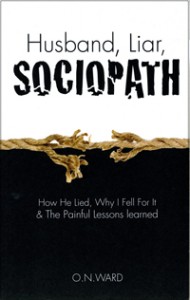Every week, a chapter of my book, “Husband, Liar, Sociopath: How He Lied, Why I Fell For It & The Painful Lessons Learned” (available via Amazon.com, just click on the title or book cover) will be published here on Lovefraud. To read prior chapters, please see the links at the bottom of the post.
Chapter 40:
Whether I was alone or on the phone with a friend or my mother, tears flowed daily. I felt worthless, entombed in quiet despair. Hardly anyone would argue that, with Daniel twelve and Jessica going on fifteen, parenting would be a breeze. Yet, my parenting unraveled far more than can be attributed to dealing with two young teenagers or preteens. I grew increasingly short-tempered with Daniel and Jessica and nagged them constantly.
As a testament to how far I had fallen and how much I had become Paul’s emotional captive, I felt that trying to regain my sense of self, my life, and my independence would be a profound betrayal of Paul, for which I would be punished through his anger, annoyance, contempt, or—ironically, what felt worse—total withdrawal of any human connection with him. Inside, I was dying. On the outside, life went on. There were meals to make, homework to help with, kids to get to practice, and other things to do.
To keep our overly rambunctious dog, Mr. Wrinkles, company, Daniel urged us to get a second pug. Daniel and Jessica named her Ella, after the protagonist in Ella Enchanted, one of Jessica’s favorite books. Daniel adored Ella just as much as he loved Mr. Wrinkles. Daniel’s challenges, which required years of therapy, had isolated him socially from other kids his age and made him the consistent target of bullies. His best friends were Mr. Wrinkles and Ella. They were a source of much needed emotional support.
One Saturday, as I was taking Mr. Wrinkles for a walk, I passed Paul and Ella in our small yard. Ella was still not fully housetrained, and she was not a fast learner, so getting her to do her “business” outside had been a struggle.
“Thanks a lot!” Paul snapped at me.
I had no idea why Paul was “thanking” me with such a caustic tone. What had I done that had been wrong, hurtful, or inconsiderate? I was simply walking down the driveway with Mr. Wrinkles. Something in me shifted. Why then? Who knows? Perhaps it was the unmistakable absurdity of the situation—that something as innocuous and well intentioned as taking Mr. Wrinkles for a walk could trigger this reaction from Paul. In that moment, the invisible gorilla became not just visible but sharply in focus.
“You’re welcome,” I said, pasting a smile on my face. Then I turned back up the driveway and continued my walk with Mr. Wrinkles.
When I returned home fifteen minutes later, Paul was waiting for me in the front yard. He was smoldering, every muscle in his body and face strained.
“What did you say ”˜you’re welcome’ for?” he snarled.
“You said ”˜thanks a lot,’ so I simply said ”˜you’re welcome’.”
I had been pounded into submission for far too long, requiring little effort on Paul’s part to keep me embracing the Cinderella role, content to be mistreated, unappreciated, and to co-mingle with the crumbs and spiders in the corner. A new game had begun, one that Paul clearly did not like.
“Do you even know why I was thanking you?” Paul asked.
“No,” I said, as cheerfully as I could, though my tone was obviously fake. I was determined not to cower. I would not be intimidated this time.
“I was thanking you, because Ella was about to pee, and you distracted her. So she didn’t! Now she might pee in the house. It’s your fault. You shouldn’t have taken Mr. Wrinkles for a walk until I came in with Ella.”
“So, you’re mad because I took Mr. Wrinkles for a walk, and as a result Ella did not pee?” I asked. “And you think that because our dog didn’t pee it’s my fault and okay to yell at me?”
“I can’t believe you’re talking to me this way. The neighbors might hear,” Paul raged.
“Really, that’s what you care about, the dog’s bladder and the neighbors? I’m not even being loud.”
“You’re shouting!” Paul yelled. “You’re embarrassing me. You should’ve known what would happen.”
My focus sharpened. It was as if a long-forbidden door was unlatched and opened just a sliver, supplying desperately needed oxygen to a hearth full of dying embers. In that moment, the coals burst into flame. Questions bolted into my consciousness. Would I ever have married this man—a man who treated me like this? If a friend had such a husband, wouldn’t I be aghast? How long had it been since Paul had not treated me this way? Why did I tolerate it? Why did I try to make things right with someone so obviously wrong? Why was every misstep and inconvenience in Paul’s life my fault? Why was nothing I did ever right? There was no love, no compassion, no honesty, and worst of all, not an iota of respect underlying this interaction or our relationship. None!
I turned and walked back down the driveway. Mr. Wrinkles and I did not come back for an hour.
In the past, I would have taken it upon myself to eliminate the tension and apologized to Paul for doing something that upset him. Not this time. Would Paul accept any responsibility for his role in the absurd encounter? I had to find out.
“Paul, I was hurt when you yelled at me about the dog,” I said when I returned.
“You were the one yelling!”
“I would really appreciate an apology,” I said, standing my ground.
“If there was something for me to apologize about, I would. But there isn’t. You lost it in the driveway and embarrassed me and then took off for an hour without telling me where you were going.”
“Paul, I don’t recall yelling.”
“You have this backwards,” Paul said.
“So I owe you an apology?”
“Yes!”
I turned away from Paul and went to my small office, closed the door, and turned on my computer.
This had to end. I had to get stronger. I researched psychologists in the area. I left messages for three of them. Over the next few weeks, I interviewed each of them on the phone and then picked one, a woman considered to be one of the best in the area. The three-week wait for her first available appointment was unbearable. But with my new clarity, not going was not an option.
Week after week, I poured my heart out to Dr. Davis and listened to her prompts that encouraged self-reflection and new understanding. Paul’s behavior continued to be “crazy making,” dismissive, selfish, toxic, and controlling in ways I still did not fully understand. No matter how preposterous my story about Paul was, my therapy stayed focused on me and getting me emotionally stronger as well as understanding how someone like me had abdicated so much control over my life and had become so weak and beholden to another person. Getting out of this negative vortex and feeling that I deserved joy and respect in my life were a tall order, but with Dr. Davis’s help, I started to make progress. Just having someone who listened to me and did not dismiss my reality was a huge leap forward.
Still, looking back, I am incredulous that Dr. Davis, one of the most respected clinical psychologists in the New Haven area, never said, “You know, your husband may be a sociopath, and if he is a sociopath, it is all about control and manipulation. You may feel emotionally depleted and worthless, because he has engaged in behaviors to make you feel that way. This gives him more control over you and the twisted satisfaction of destroying you. Not only does he not love and respect you now, he has never loved or respected you, because sociopaths are incapable of such emotions. His insensitive behavior may not be due to sleep deprivation, stress at work, his childhood, your own imperfections, or even possible depression. Such things can be ‘fixed,’ but being a sociopath is forever.
“Sociopaths lack the capacity to care about other people. They only use people for their own purposes and discard them when they’re done. Sociopaths have no moral compass. They lie, cheat, and steal as easily as they breathe. They also take ridiculous risks and typically have an insatiable appetite for sex. This ongoing affair with Anne-Marie you have been worried about is probably just the tip of the iceberg. His sex drive is probably being satisfied in ways to which you are completely oblivious and cannot even imagine. In fact, you should get yourself tested for sexually transmitted diseases and always have protected sex with him.
“Moreover, getting away from and divorcing a sociopath can be very complicated and even emotionally and physically risky for you and the children, because it threatens the things that motivate him the most—power and control. He has complete power and control now. He will not relinquish them easily. You will need to take precautions financially, because he will never be fair to you in a divorce. Once you are no longer any use to him, he will just toss you aside and try to minimize the financial damage. Be prepared for him to use your children as pawns to hurt you emotionally as well as financially. What’s ‘right’ and what’s ‘legal’ will mean nothing to him.”
I would have liked to know that there was at least a strong possibility that Paul was a sociopath, because if I did, once I got stronger, the only logical decision would have been to leave.
Start from the beginning:
Go to previous chapter:
Go to the next chapter
Notes
Identifying names, places, events, characteristics, etc. that I discuss here and in my book have been altered to protect the identity of everyone involved.





































 Learn to use EFT Tapping to heal your life – FREE 10-day online summit starts 2/27
Learn to use EFT Tapping to heal your life – FREE 10-day online summit starts 2/27
FleeingDeer
I had several of those moments during the course of my 15 year marriage. Whenever I started to believe in my own worth and believe that I ought to be treated as a human being worthy of a basic level of respect, then his belittling and cut-downs would chaff.
One of the last moments was a Sunday where I went to church with 4 of the 5 kids. He had been giving me the silent treatment for 3 days straight – and with my PTSD, I have forgotten what the silent treatment was for. But unbeknownst to him, I had visited a lawyer 4 days prior and decided in her office that I was finally going to leave. So those 3 days of silent treatment were actually a blessing. They gave me space to think, to work with the kids on chores, to come to the realization that we were going to be ok – the kids and I would rise to the occasion and be able to handle life on our own. So whereas normally I would wither and fade during the silent treatment, this time I grew my roots deeper, found a deeper source of water, and grew stronger.
Anyway – so Sunday morning I took 4 kids to church and was chipper, upbeat, actually HAPPY with them. It was amazing! We got home and i was getting the kids out of the van. There’s a part of the yard where the grass has died and the neighborhood cats are using it as a litter box. So I told my kids to stay on the sidewalk and off the yard…. but of course, the 2yo walked RIGHT through that aread and my 5yo did as well. Husband met me at the door, I explained, and he assisted me to stop and check and remove the 5yos shoes before he got in the house. Ok. Now 2yo’s turn. Husband was standing in the house, I was just on the outside, holding the glass door open with my rear, we were both holding the 2yo trying to get first one shoe off and then the other, when the dog bolted for freedom.
Now – the dog had been making a run for it often – 2 to 3 times a week – (he’s a puppy and untrained. My first dog ever – so I don’t know how to train him, and of course husband hasn’t done ANYTHING to really train him) but boy does husband get mad and yell at us when he gets out! Yelling that the neighbors are all upset with us. So – what do I do? I quick try to grab him by the collar as he runs past – letting go of the 2yo as I do who then falls and… according to husband “hits the concrete with his face” I think he put his hands out and caught himself. There wasn’t any big scar or scratch. He was fine. But he yells at me and I rankle under the treatment which really was a “anybody could’ve done it” and stomp off.
He doesn’t acknowledge my attempt to catch the dog. “Thanks for trying to catch him.” Doesn’t acknowledge the fear he’s implanted in my soul because of his tirades after all the other times the dog has run. And of course, doesn’t realize that the contrast between the wonderful, lovely morning with my children and his treatment of me right when I am coming in the house is a visible contrast.
Just further cemented the decision I had made 4 days prior to finally leave him… it would be another 5 days before I would drive away with the children for good – but neither he nor I knew that at the time. 🙂
Hope Springs
Yes, this ‘stage’ where the abused has had enough and starts to get angry, instead of sad, and starts to fight back, is a necessary and, likely inevitable, stage. This is when the abuser finally finds the strength to leave, or at least, realizes that they can leave and that they will be alright and far better off. We all only have one life on this earth.
Hope Springs
Sorry…I meant ‘abused’ finally realizes…NOT the abuser.